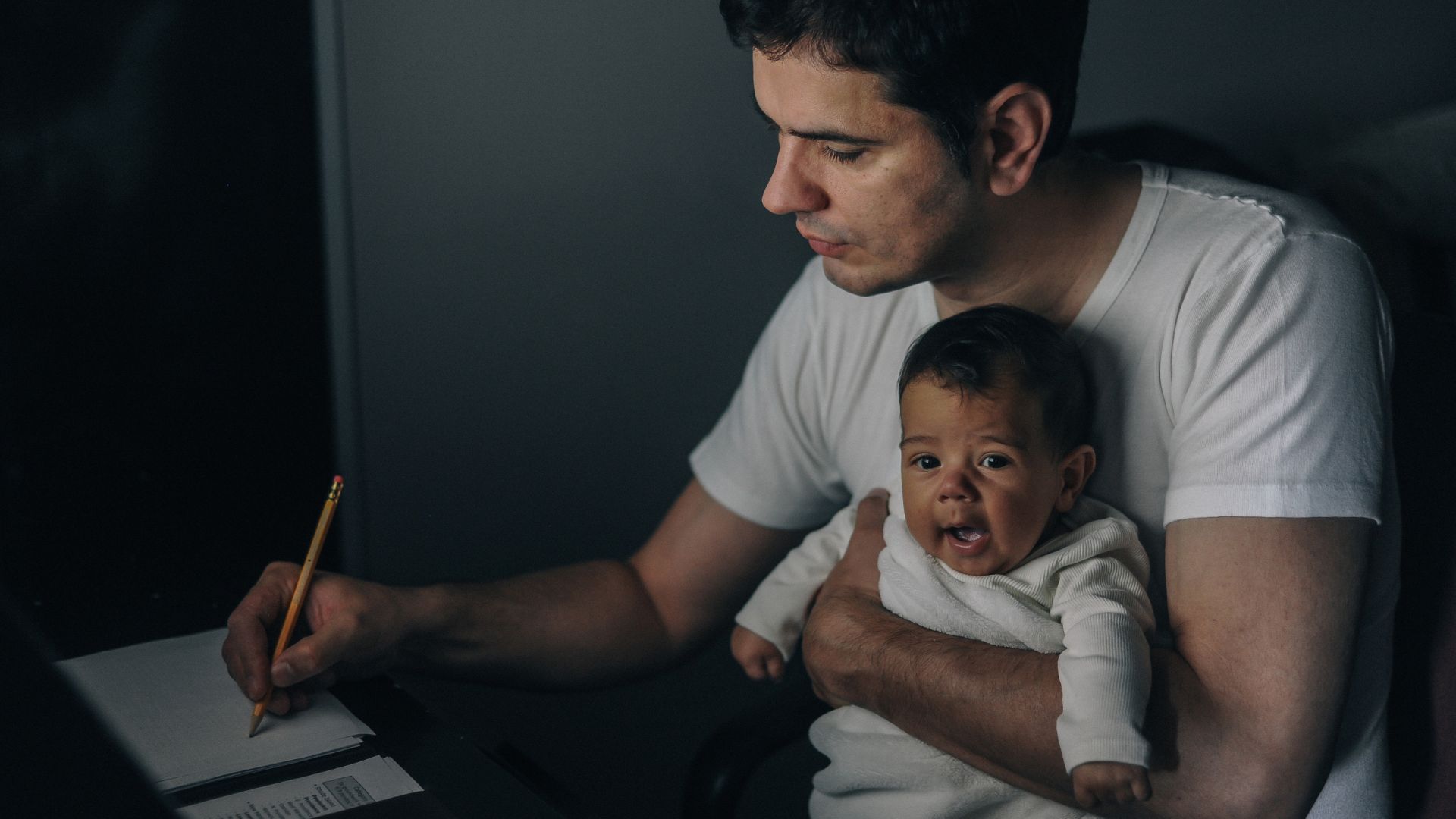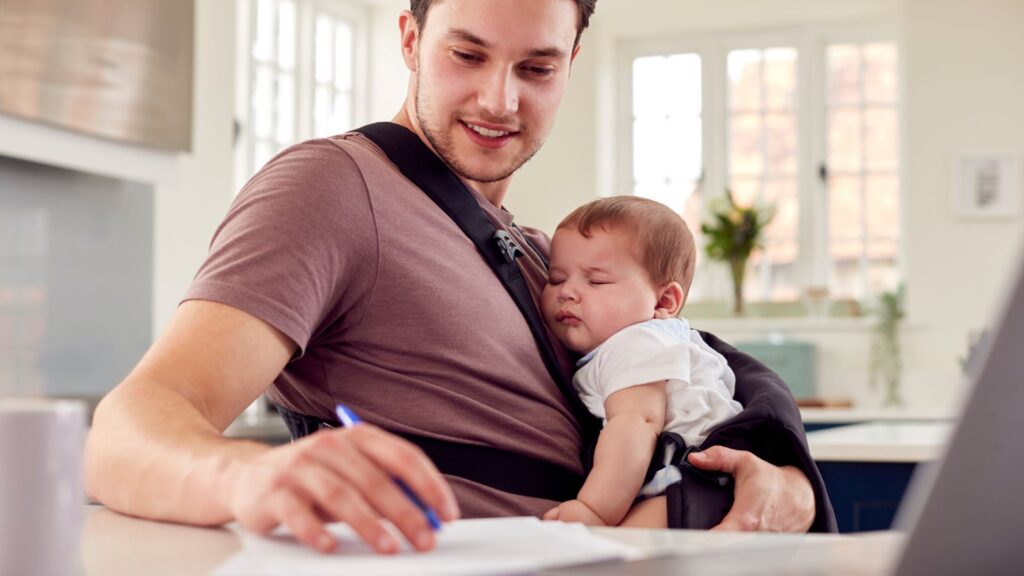You might feel like you’re the only one going through this, but you’re not on your own. In the UK, thousands of dads are raising children solo, and the number of single fathers has been steadily rising in recent years.
Caring for a newborn on your own can be a massive shift sleepless nights, no time to yourself, and sometimes feelings of guilt or loneliness. That’s all completely normal. Go easy on yourself, and take it one day at a time.
You don’t need to have it all figured out. What matters most is patience, a bit of self kindness, and a willingness to learn as you go. And if you ever need a bit of advice or support, there’s help available for single dads of newborns.
Challenges for Single Dads
Embracing Imperfection
You might feel pressure to get everything right. Many people think dads need to be perfect or that fatherhood means giving up your whole life. That is not true.
You do not need to do everything perfectly. Progress matters more than perfection. Every day, you learn something new. Sometimes you will make mistakes. That is normal. Babies do not need a perfect parent. They need love, care, and your presence.
Celebrate small wins. Did you calm your baby today? Did you manage a feeding without a mess? Those moments count.
Some people believe men are less nurturing or cannot bond with babies like mothers do. Research shows that dads can form strong bonds through skin to skin contact, feeding, and play. Nurturing is something you learn by doing, not something you are born with.
Handling Criticism
You may hear comments or face doubts from others. Some people think fathers are just babysitters or that dads matter less in the early years.
These ideas are myths. Studies show that involved fathers help their babies grow smarter and more confident. You are not just a helper, you are the parent.
- Ignore negative comments when you can.
- Trust your instincts.
- Ask for advice from people who support you.
If you ever feel unsure, remember there are many parenting tips for single dads of newborns available. You are not alone in this journey.
Managing Emotions
Raising a newborn can feel overwhelming. You might feel tired, worried, or even sad sometimes. That is okay. Many dads think they should not need help or talk about their feelings. This is another myth. Taking care of your mental health helps you and your baby.
It is strong to ask for help when you need it. Talk to a friend, join a group, or reach out to a professional if things feel too heavy.
You are doing something important. Your emotions matter. Take care of yourself so you can take care of your child.
Parenting Tips for Single Dads of Newborns

Routines
You might feel like every day with a newborn is unpredictable. That’s normal. Building routines helps you and your baby feel more secure.
Start with simple patterns for feeding, sleeping, and diaper changes. Babies thrive on predictability, and so do you.
- Use digital tools like Google Calendar or Notion to track appointments, reminders, and medical records.
- Keep a health file with vaccination records and emergency contacts.
- Batch tasks like bottle prep or laundry to save time.
- Baby proof your home by covering outlets, using safety gates, and checking smoke detectors.
- Adapt routines as your baby grows. Flexibility is key.
If you’re looking for parenting tips for single dads of newborns, start with routines. They make life easier and help you spot changes in your baby’s needs.
Feeding
Feeding a newborn can feel overwhelming, but you can do it. Most newborns need to eat every 2 3 hours, which means 8 12 feedings in 24 hours. Watch for hunger cues like rooting, sucking, or fussiness.
- Prepare bottles or formula in advance if possible. Batch prep saves time.
- Responsive feeding works well. Hold your baby, make eye contact, and talk softly during feeds.
- If you use formula, buy only a small can at first. Your baby’s needs may change.
- If you use breastmilk, store it safely and label bottles with dates.
- Cluster feeding is normal, especially in the evenings. Your baby may want to eat more often for a few hours.
Feeding time is bonding time. Use your forearm as a pillow to support your baby’s head and neck. This keeps both of you comfortable.
Many parenting tips for single dads of newborns focus on feeding. Don’t worry about doing it perfectly. Focus on being present and responsive.
Diapering
Diaper changes happen often, but you’ll get the hang of it. Here are some practical tips:
| Best Practices | Common Mistakes | Tips for Dads |
| Use a stable changing surface | Leaving baby unattended | Keep supplies within reach |
| Wash hands before & after | Using wrong diaper size | Distract baby with a toy or song |
| Use hypoallergenic wipes | Rushing changes | Prepare area to avoid mess |
| Apply diaper cream at first sign of redness | Not using cream for rash | Check diaper bag before outings |
- Wait a few minutes after your baby soils a diaper to avoid a mess.
- Don’t change diapers that are barely wet. This saves money and reduces waste.
- Always wash your hands after each change.
- Keep diaper pails out of reach.
- Buy only a small pack of newborn diapers at first. Babies grow fast!
If you need more parenting tips for single dads of newborns, remember: patience and preparation make diapering easier.
Soothing
Newborns cry for many reasons. You can help calm your baby using proven techniques. Pediatricians recommend the “5 S’s”:
- Swaddling: Wrap your baby snugly in a blanket.
- Side or Stomach Position: Hold your baby on their side or stomach (while awake).
- Shushing: Use white noise or gentle “shh” sounds.
- Swinging: Rock or sway your baby gently.
- Sucking: Offer a pacifier or let your baby suck their hand.
Other ways to soothe include gentle massage, singing, or walking with your baby in a carrier. Wearing your baby in a sling or wrap keeps your hands free and helps your baby feel secure.
Many parenting tips for single dads of newborns highlight the importance of soothing. You’ll learn what works best for your child with practice.
Safe Sleep
Safe sleep is one of the most important things you can provide. Always place your baby on their back for naps and nighttime. Use a firm, flat mattress with only a fitted sheet.
- Keep the crib or bassinet free of pillows, blankets, toys, and bumpers.
- Never let your baby sleep on an adult bed, couch, or armchair.
- Room sharing is safest. Place your baby’s crib or bassinet in your room, but not in your bed.
- Move your baby to their own sleep space if you fall asleep while feeding or comforting them.
- Car seats and strollers are not safe for regular sleep.
Note: Babies with reflux should still sleep on their backs unless your doctor says otherwise.
If you follow these parenting tips for single dads of newborns, you’ll help keep your baby safe and healthy while they sleep.
Bonding with Your Newborn
Skin to Skin
Skin to skin contact is one of the best ways to bond with your newborn. You simply hold your baby against your bare chest. This simple act does a lot for both of you:
- It helps your baby keep a steady body temperature and breathing rate.
- Your baby cries less and feels more secure.
- Skin to skin boosts your confidence as a dad and helps you feel more connected.
- You learn to read your baby’s cues and feel less stressed.
- Even if your baby’s mother cannot do skin to skin right away, you can step in. Your touch is just as comforting.
Many dads say they feel calmer and more relaxed during these moments. Try to make skin to skin part of your daily routine, even if it’s just for a few minutes after a feeding or before bedtime.
Talking and Reading
Your voice matters. When you talk or read to your newborn, you help their brain grow. Research shows that dads who use lots of different words and read picture books with their babies help their children develop better language skills later on. You don’t need fancy books or perfect grammar. Just describe what you see, sing a song, or tell a story.
- Ask questions, even if your baby can’t answer yet.
- Use simple words and repeat them often.
- Make reading a habit, like before naps or at bedtime.
These small moments build your child’s vocabulary and help you connect.
Play and Presence
Play is not just for fun—it helps your baby learn and grow. Unstructured free play, like making faces or gentle tickling, supports emotional and cognitive development. Fathers often bring a special energy to playtime, and your involvement teaches your baby about trust and joy.
| Type of Play | Why It Matters | How to Do It |
| Unstructured free play | Builds resilience and reduces stress | Let your baby move arms and legs freely |
| Physical play | Boosts social and cognitive skills | Try gentle bouncing or tummy time together |
| Everyday moments | Strengthens your bond | Smile, make eye contact, and talk during diaper changes |
Your presence means everything. Even a few minutes of focused play each day helps your baby feel loved and secure.
Self Care for Single Fathers
Recognizing Burnout
You might feel tired all the time or notice you get angry more easily. Sometimes, you may focus too much on work or hobbies just to escape.
Burnout can sneak up on you, especially when you try to do everything alone. Here are some signs to watch for:
- Trouble sleeping or constant fatigue
- Headaches, back pain, or other aches
- Feeling irritable or mentally foggy
- Pulling away from friends or family
- Losing interest in things you used to enjoy
- Feeling trapped, guilty, or ashamed
Studies show that burnout in fathers is real, even if the numbers seem small. For example:
| Study (Country) | Sample Size | Burnout in Fathers | Notes |
| Poland | 802 | 1.4% – 2.3% | No single dad data |
| Lebanon | 66 | 3% – 4.5% | Higher in single parents |
| Japan | 600 | 4.2% – 17.3% | No newborn data |
You might not want to ask for help, but ignoring burnout can make things worse. If you notice these signs, take them seriously.
Simple Self Care
Taking care of yourself helps you care for your baby. You do not need fancy routines. Try these simple ideas:
- Take a few deep breaths when you feel stressed.
- Write down three things you are grateful for each day.
- Try a short walk or stretch when your baby naps.
- Listen to music or a podcast you enjoy.
- Practice mindfulness or meditation, even for five minutes.
- If you feel overwhelmed, talk to a counselor or therapist.
These small steps can lower stress and boost your mood. Many dads find that self care helps them stay patient and present.
You can find more parenting tips for single dads of newborns by connecting with others or reading trusted resources.
Accepting Help
You might think you have to do it all alone, but that is not true. Many single fathers struggle to accept help because of old ideas about what dads should do. Some common barriers include:
| Barrier | Why It Happens | What You Can Do |
| Few support groups for dads | Most groups focus on moms | Look for father specific groups or start one |
| Feeling left out | Society often overlooks dads | Ask for inclusion and share your needs |
| Money worries | Work can take up your time | Balance work and parenting, ask for flexible hours |
| Not enough role models | Few examples of single dads | Connect with other fathers online or in your area |
| Pressure to be tough | Culture says men should not ask for help | Remember, real strength means reaching out |
You can build your own support network. Reach out to friends, family, or other dads. Accepting help is a sign of strength, not weakness. When you take care of yourself, you set a great example for your child.
Building a Support Network
Family and Friends
You do not have to do this alone. Family and friends can make a huge difference, especially in the first weeks. Ask someone you trust to stay with you or visit often.
Even a few hours of help can give you time to rest or run errands. Most single fathers talk with friends (82%) and family (71%) before becoming parents. These conversations help you feel less alone and more prepared.
| Aspect | Evidence Summary |
| Social Support Levels | 59% of single fathers report high support, similar to mothers (63%). |
| Impact on Well being | More support means less anxiety and stress. |
| Fathers’ Actions | Many dads choose supportive networks to help with parenting and social acceptance. |
| Psychological Resilience | Positive support builds resilience and well being, even if you feel judged. |
Parenting Groups
Parenting groups connect you with other dads who understand your journey. You can join in person or online groups. Both offer support, advice, and friendship.
Online groups give you 24/7 access and privacy. In person groups let you share face to face and build local friendships.
- Groups help you talk about challenges, share tips, and learn new skills.
- You get emotional support and guidance for tough days.
- Many dads find new friends and role models in these groups.
- Some groups offer classes just for dads, which help you feel more confident.
Fatherhood groups, especially those led by skilled facilitators, give you a safe space to talk about your feelings. These groups can boost your mental health and help you become a more involved parent.
Professional Resources
Sometimes you need more than friends or groups. Professional resources can help you handle tough moments. You can try therapy, parenting classes, or childcare services. Many programs focus on dads and offer coaching, workshops, and online courses.
- Therapy gives you a place to talk and learn new ways to cope.
- Parenting classes teach you about routines, discipline, and self care.
- Support groups and online communities let you share stories and get advice.
- Programs like Help For Men’s Brotherhood and Head Start focus on single fathers.
Research shows that dads who use these resources see big improvements in parenting and well being. You do not have to be perfect. Just keep reaching out and learning. Every step you take helps you and your baby thrive.
You can raise a happy, healthy newborn as a single dad. Research shows that when you stay engaged, play with your child, and take responsibility, your baby grows stronger and more confident.
- Stay present and enjoy the little moments—smiles, cuddles, and giggles matter.
- Connect with other dads, ask for help, and use support services when you need them.
- Take care of yourself, too.
Every step you take counts. Celebrate your progress and keep reaching out. You’ve got this!
FAQ
How do I know if my baby is eating enough?
Watch for steady weight gain, regular wet diapers (about 6–8 a day), and contentment after feeds. If you worry, ask your pediatrician. Trust your instincts—you know your baby best.
What if I feel overwhelmed or sad?
You are not alone. Many single dads feel this way. Talk to a friend or a counselor. Take breaks when you can. Even a short walk or deep breaths can help you reset.
Can I bond with my newborn as well as a mom can?
Absolutely! Your baby loves your voice, touch, and presence. Skin to skin time, talking, and play all help you connect. Dads form strong bonds every day.
How do I handle visitors who want to help?
Set clear boundaries. Let people know what you need—maybe a meal, a quick errand, or just company. Most friends and family want to support you. Don’t be afraid to ask.
What should I do if my baby won’t stop crying?
Try the “5 S’s”: swaddle, side/stomach hold, shush, swing, and suck. Sometimes babies cry even when you do everything right. If you feel frustrated, put your baby in a safe place and take a short break.



